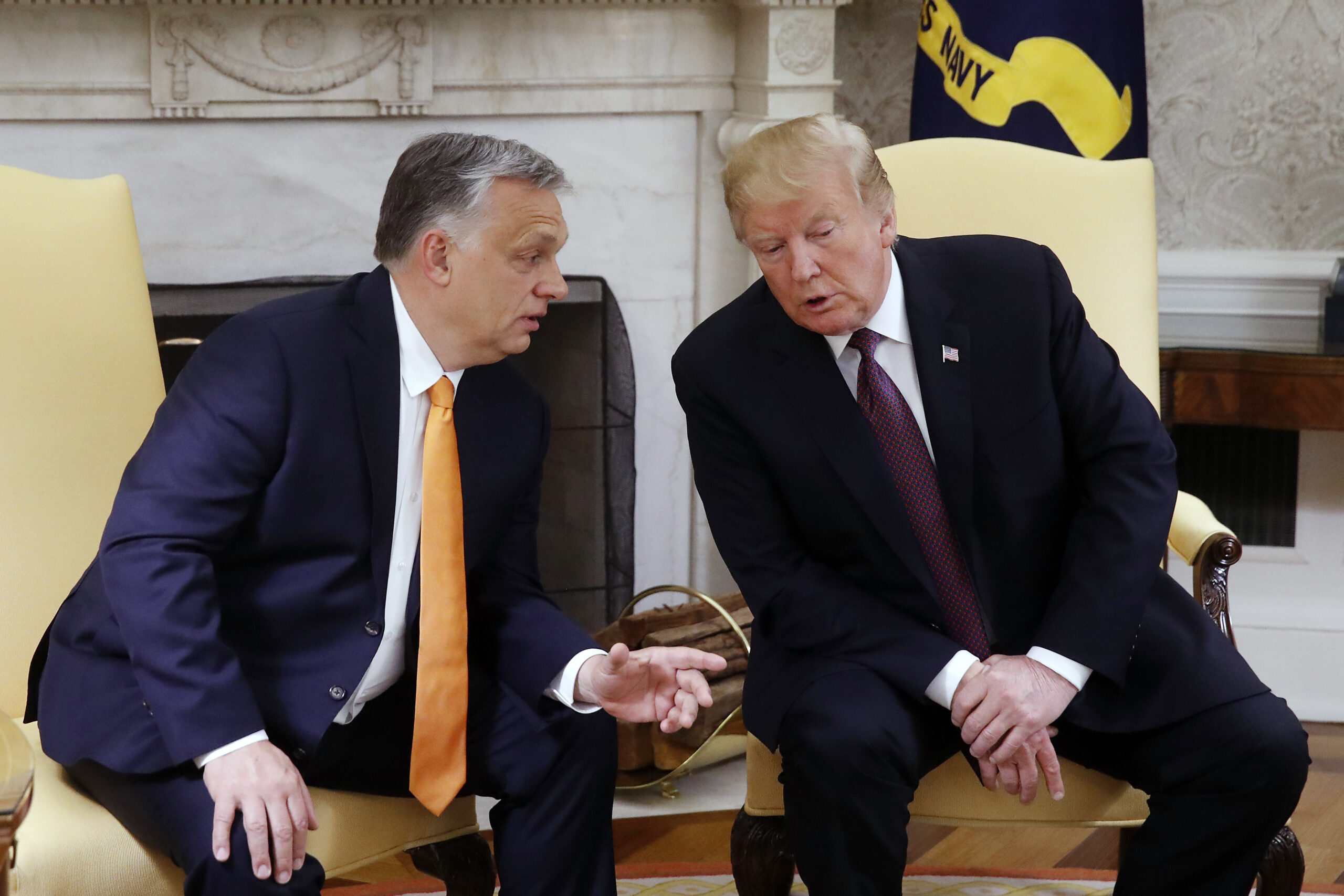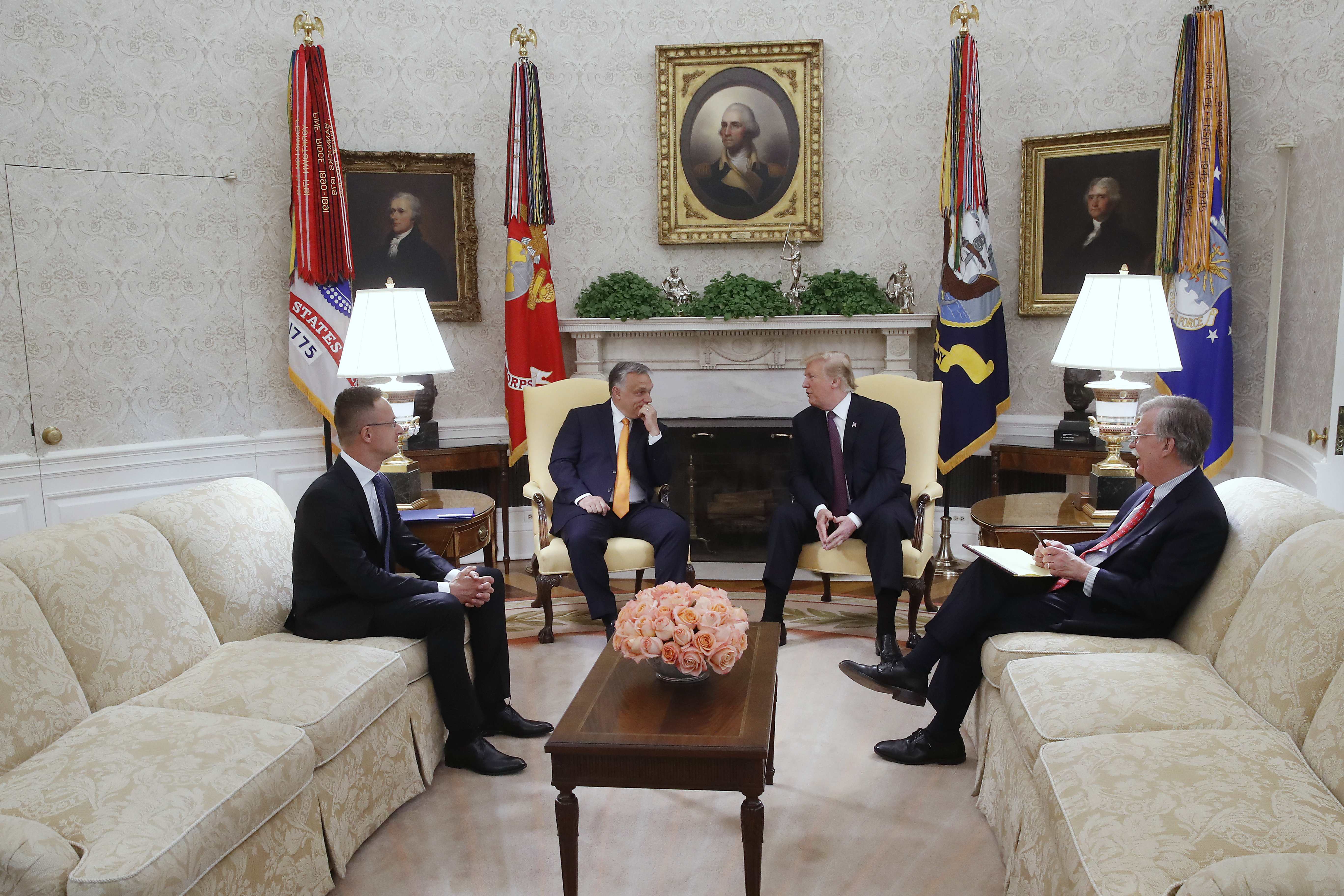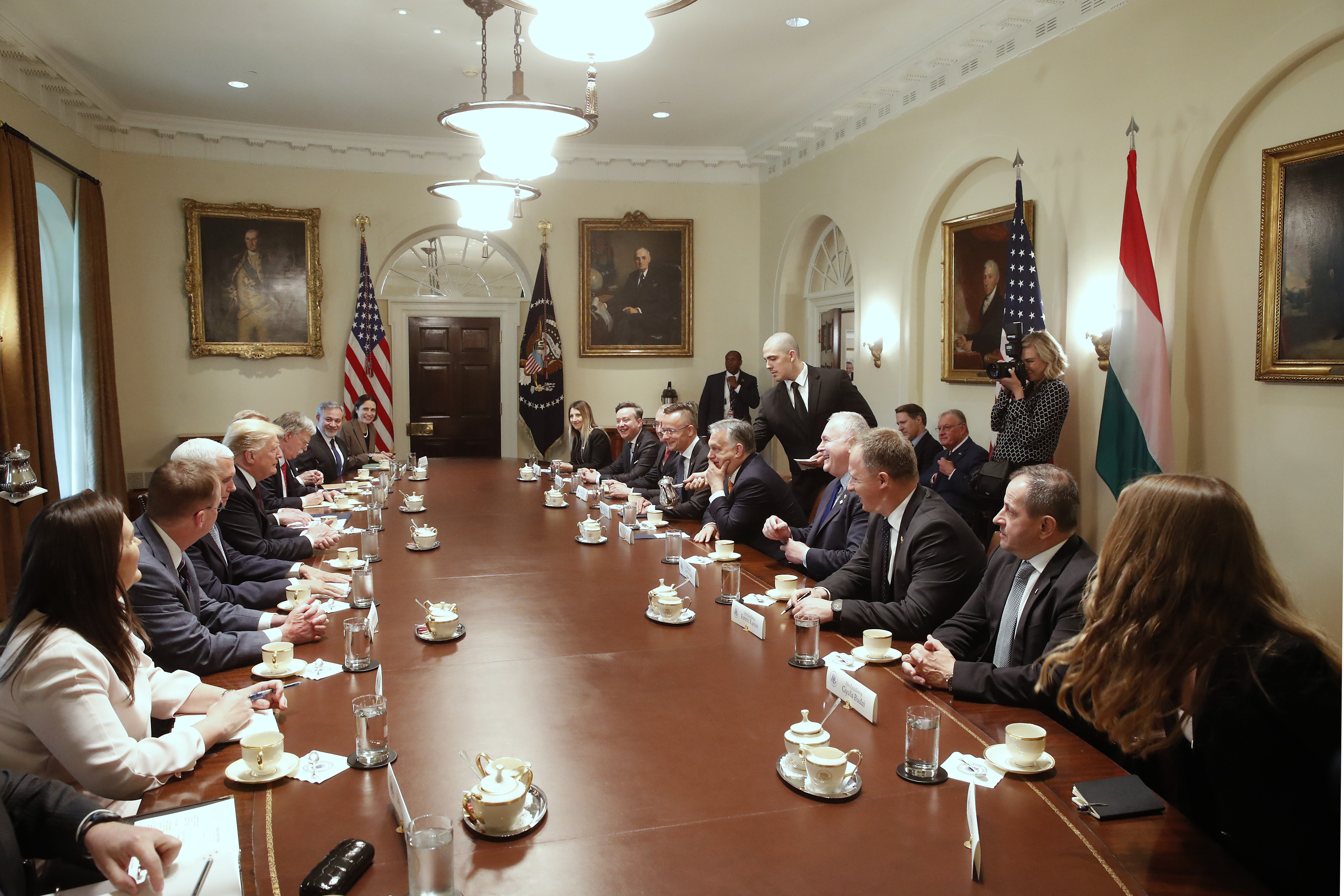How Viktor Orban got involved in Trump’s Ukraine scandal

Hungarian and U.S. delegations were going through the agenda point-by-point during the May 13 meeting between Prime Minister Viktor Orban and President Donald Trump, when acting Secretary of Defense Patrick Shanahan, sitting on Trump’s side in the Cabinet Room of the White House, took over. As he was in charge of the topic, he wanted to turn to a controversial issue: Ukraine. However, Trump immediately cut him short, saying that “we have already discussed this with the Prime Minister in private”, referring to Orban. Trump also added, that after his private talks with Orban, everything was clear to him regarding Ukraine, and that Orban knew better.
The scene was described to Direkt36 by a participant of the plenary session of the May 13 Orban-Trump meeting, where about two dozen people were present. It was also confirmed by a Hungarian source with indirect information of the conversation. This brief discussion gained importance, because during the House impeachment hearings against Donald Trump, several witnesses said, that in their opinion, Viktor Orban may have had tuned the president against Ukraine.
Trump is accused of deliberately withholding U.S. military aid to Ukraine and also of tying newly-elected President of Ukraine Volodymir Zelensky’s White House invitation to him launching an investigation into a case related to the son of former Vice President Joe Biden, Trump’s main Democratic challenger. Trump is suspected of abusing the power of his office for personal gains, which is against the law and which led to the impeachment inquiry. During these hearings, multiple influential officials were questioned about Trump’s relationship to Ukraine by members of the House of Representatives.
Several witnesses of the inquiry have said that Trump’s hostile attitude towards Ukraine is partially due to the influence of Viktor Orbán. These findings on the alleged role of Viktor Orbán and Hungary were also included in the impeachment report published last Tuesday. Orban previously remarked that it is nonsense to believe that he had influenced Trump. Now Direkt36 has uncovered new information about the Orban government’s dealings regarding Ukraine, how it managed to gain some U.S. support, and how much of Orban’s alleged influence on Trump is true.
What did Trump and Orban discuss?
Viktor Orban was overall pleased with his White House talks with Donald Trump in May. After shaking hands and saying goodbye, he and his colleagues went to lunch in Washington for a debriefing, a Hungarian government official told Direkt36. Only the Prime Minister and members of his negotiating team, Hungarian ministry leaders and diplomats attended this late lunch in Washington. Foreign Minister Peter Szijjarto joined the Orban-Trump private meeting at one point, but the rest only sat in on the general, plenary session of the meeting. Therefore, at the informal lunch, Orban also gave a brief readout to his subordinates on topics that he and Trump had touched during their private meeting, according to a government source familiar with the discussion.
This was the much-scrutinized meeting at which Orban was inciting Trump against Ukraine, according to claims by multiple U.S. officials. Several articles on Orban’s alleged influence have been published in Hungarian and English, and testimonies have also been made public in the ongoing impeachment process against President Trump. For example, special adviser on Europe and Russia for Vice President Mike Pence, Jennifer Williams talked about the fact that the President had instructed Pence not to travel to Kyiv for the inauguration of President Zelensky on the day of the Orban-Trump meeting. Williams also said that although she did not know the details, Orban raised the topic of Ukraine because of its education law and the language rights of the Hungarian minority population.
But the biggest controversy was sparked by the testimony of George Kent, Deputy Assistant Secretary of State for European and Eurasian Affairs. Kent claimed, among other things, that Viktor Orban was inciting Trump against Ukraine because of Transcarpathia.
“Viktor Orban’s beef with Ukraine is derived in part (from) his vision, in my opinion, of a Greater Hungary… I think Orban is just happy to jam Ukraine”,
Kent said in his testimony. However, Kent added that this is his own opinion, he has no direct information on what Orban and Trump were talking about in private. He also claimed that he was briefed on Orban’s role by another witness of the impeachment hearings, former national security adviser Fiona Hill. According to Kent, Trump’s personal lawyer Rudy Giuliani, Vladimir Putin and Orban were the ones who solidified Trump’s negative image of Ukraine as a corrupt country that intervened in the 2016 U.S. presidential election in the interest of the Democratic Party.

The private meeting of Viktor Orban and Donald Trump in May. Photo: kormany.hu
Kent’s testimony became a diplomatic affair. Hungarian Deputy Minister of Foreign Affairs Levente Magyar summoned the U.S. Embassy’s deputy chief of mission to tell him that Kent’s words were irresponsible, unfounded, and obstrusive to the reconciliation of the Hungarian-Ukrainian relationship. Orban’s Chief of Staff Gergely Gulyas called these statements “fake news”, while Orban commented that
“there’s no upper limit on nonsense,” and “one really holds one’s head in one’s hands and one can’t decide whether or not it’s good for the world to know about us: whether they should pay attention to us or leave us alone.”
According to information obtained by Direkt36, Ukraine was indeed discussed at the meeting between Orban and Trump, and the topic was also mentioned by the Hungarian Prime Minister to his colleagues at his Washington lunch after the White House meeting, according to a government source familiar with the discussion. Orban told his colleagues that he had explained to Trump in person why the Hungarian government was blocking talks between NATO and Ukraine. Orban justified this move by saying that this is a way for Hungary to protest against Ukraine’s education law, which is detrimental to the Hungarian minority living in Transcarpathia.
How U.S. toughness evaporated
The education law was introduced in the Ukrainian parliament to suppress Russian language in the name of nation building and unification and came into force on September 28, 2017. However, Hungarian language education also fell victim to the law. In response, the Hungarian government blocked the NATO-Ukraine Commission’s ministerial level meeting in December 2017 by not agreeing to invite Ukraine as a participant to the meeting. The act of blocking meetings has since become a tradition. The Hungarian government has been preventing the NATO-Ukraine Commission from officially inviting Ukraine to meetings of ministers of defense, ministers of foreign affairs or to other high-level talks. This happened in July and December 2018 and in March 2019. At a lower level, however, negotiations could continue.
However, Hungary’s blocking of NATO-Ukraine talks upset several NATO allies. Representatives of 11 member states – including the UK, the U.S. and Germany – sent a joint letter of protest to the Hungarian government. They argued that NATO is not the appropriate forum for resolving a bilateral foreign policy conflict, especially when Ukraine is in need of solidarity due to Russian aggression. The Orban government responded that NATO documents also insist respecting minority rights, and Hungary refuses to sacrifice the protection of the Hungarian minority for geopolitical interests.
In the end of 2017, U.S. special envoy to Ukraine Kurt Volker immediately wanted to meet with Viktor Orban to find a solution to the conflict together. However, the White House did not allow him to negotiate, according to a former White House official talking to Direkt36 on condition of anonymity. Back in those days, experts and advisors of the Trump administration were still following the Hungary policy of the Obama era. This meant that high-level meetings with the Hungarian government were not supported due to Hungary’s corruption and rule of law issues, alleged pro-Russian policies and other objections.
Volker, one of the key witnesses to the Trump impeachment hearings, has known Orban for a long time. Although they had not officially met at the end of 2017 due to resistance from the White House, Volker had spoken to Orban earlier at a dinner. Among other topics, they talked about Ukraine.The conversation was relayed to Direkt36 by two sources who have knowledge of it from Volker’s point of view. According to Orban, Ukraine has always been and always will be a buffer state between Russia and Europe. Orban also stated that Ukraine’s Western integration is unrealistic. (Orban talked about Ukraine as a „security buffer” in a German interview already in 2014, which he later repeated in his 2018 Baile Tusnad speech, where he also said that Ukraine’s EU and NATO integration is unrealistic.) Volker thought that Orban’s attitude towards Ukraine was cynical, but he did not think it was pro-Russian. He also thought that Hungarian measures in NATO against Ukraine’s education law are favorable to Russia, but he did not believe that Orban was acting out of Russian interests.
By early 2018, new officials had taken senior roles in shaping U.S. foreign policy. The U.S. position on the Orban government had begun to soften. By then, there was a prevailing opinion in the U.S. government that Orban was desperately seeking attention and respect from the Trump administration and his actions against Ukraine were also part of this effort hence the issue could be resolved through diplomatic gestures. According to State Department officials, Wess Mitchell, who was Assistant Secretary of State for European and Eurasion Affairs at that time, had offered Orban a joint photo opportunity with Trump if he would compromise on the Ukrainian issue. Later, U.S. Secretary of State Mike Pompeo would only be willing to hold a joint press conference in May 2018 after his meeting with Peter Szijjarto if they could announce a change in Hungarian position on Ukraine. In both cases, the Hungarian side said no to resolving their symbolic veto. According to a Hungarian foreign ministry official, they did not use the Ukraine issue simply as leverage, but the Ukrainian education law was a genuinly important issue for Hungarian minorities living abroad, hence the government did not want to let it go.
By the fall of 2018, U.S. diplomacy seemed more open to Hungarian arguments on the Ukraine-NATO issue. Part of the reason for this was that other topics – energy and arms deals, and a defense cooperation agreement – became more important to the United States than resolving the protracted Ukrainian-Hungarian conflict. A senior Hungarian foreign ministry official added that the Orban government also felt that the White House already had its hand off the unpopular Poroshenko, who eventually lost reelection in Spring 2019.

The plenary session of Viktor Orban and Donald Trump’s meeting in the Cabinet Room of the White House in May. Photo: kormany.hu
Direkt36 had previously published a diplomatic cable sent by the Hungarian Ambassador to Washington DC in November 2018. It stated that “in the case of Ukraine, the American side now agrees with the Hungarian position regarding Ukraine’s nationalist attitude and the dangerous precedent its education law could set,” The cable quotes Wess Mitchell, who acknowledged that
“Hungarian objections over Ukraine’s education law concerning minorities are legitimate, and the U.S. is constantly raising this to the Ukrainian side.”
Not only the Americans became more open to the arguments of the Orban government, the Hungarian attitude was changing and became more refined too. Mediation by British diplomacy played an important role too as they maintained good relations with both the Hungarian and Ukrainian governments, several EU diplomats told Direkt36. While the Hungarian government continued to obstruct official high-level meetings of the Ukraine-NATO Commission, the Americans and the British used small tricks to make sure that Ukraine would still be present at the talks, even if not officially invited. For example, it was not Ukraine officially invited to a NATO meeting, but the so-called Black Sea countries that are Georgia and Ukraine. In July 2018, this is how president Poroshenko could still be there at a NATO meeting in Brussels under the pretext of a Black Sea side event. Later in the spring of 2019, Ukraine was able to take part in informal talks and semi-official breakfast working meetings. The Hungarian government has not publicly objected to either solution.
Orban’s charisma has its limits
On November 14, Viktor Orban attended a meeting of representatives of Hungarian communities living all over the world, the Diaspora Council. He responded to remarks that he could have influenced Donald Trump’s perception of Ukraine. According to the Prime Minister, „there are times when the world takes things too far” about Hungary.
However, there are indications that the Hungarian government does not actually want to undermine the new Ukrainian president. Zelensky was only president-elect at the time of the Orban-Trump meeting and only took office a week later. Moreover, after Poroshenko’s nationalist leadership, the Hungarian government was cautiously optimistic about the incoming new president. “Orban’s policy is to give some time to Zelensky, and that he should not be pressured with the Hungarian issues right now,” said an EU diplomat who closely followed the evolution of the Hungarian-Ukrainian relationship. Orban also wanted a personal meeting with Zelensky. He himself mentioned this in his speech at the Diaspora Council, but he said they had “failed to meet” despite repeated attempts.
In early October, the Hungarian Prime Minister attempted to meet with the Ukrainian president without the public at the Hungarian consulate building in Transcarpathia’s Uzhgorod, Direkt36 has learned from two foreign diplomats following Hungarian-Ukrainian relations. Only a few people were involved on each side in the organization of the meeting. Preparations were already underway at the consulate when it turned out that there was some misunderstanding, hence the meeting did not take place. The secrecy surrounding the meeting was in part due to the fact that Viktor Orban was still viewed negatively in Ukrainian public opinion, and that “for Zelensky to personally sit down and cut a deal with Orban would be like doing business with Putin,” said a foreign diplomat who knows the new Ukrainian administration well.
The Hungarian Prime Minister’s spokesman did not respond to a request for comment. The Ukrainian Embassy in Budapest acknowledged that a meeting was agreed upon, but said that “to our knowledge, the exact date of the meeting had not been discussed”. Ukrainian Minister of Foreign Affairs Vadym Prystaiko said in late October that, despite existing plans, “there is simply no time physically to have such a conversation right now.”
Meanwhile, in the end of October, the Hungarian government achieved a breakthrough in putting pressure on Ukraine over the education law through NATO. At first, it seemed that the Hungarian government could not achieve to include a mention of the Transcarpathian Hungarians’ issue in a joint statement of NATO ambassadors after a NATO-Ukraine meeting in Kyiv in late October, and would therefore veto the entire statement. News reports and statements on the veto had already been published when the Hungarian position unexpectedly gained support. Finally, in the closing statement of the meeting on October 31, NATO called on Ukraine to fully comply with the recommendation of the Venice Commission to amend the education law of 2017. Ukraine agreed to do so.
According to two sources familiar with the circumstances of how the statement was put together, the Hungarian success this time was partially due to internal differences within the Ukrainian delegation. Foreign Minister Prystaiko, who served as Deputy Minister of Foreign Affairs under Poroshenko and thus represents continuity in Ukrainian foreign policy, still did not want to compromise on the education law, but his deputy, Yehor Bozhok agreed to accept a statement amended by the Hungarian. The final decision was made by President Zelensky who officially accepted the Hungarian claim, bringing the two-year dispute closer to a resolution.
“Ukraine’s foreign ministry would still be pushing the same old line, while the new Zelensky policy has not yet developed its position on minorities and Hungary. This is not a priority for the President, but his decision also shows that he is open to compromises,” added a diplomatic source following the development of the Ukrainian-Hungarian relationship. Meanwhile, the Hungarian counterpart has also made gestures in recent times. Previously, Hungary gave support almost exclusively to Transcarpathia, but it has now informally offered to provide financial support for the reconstruction of the iconic bridge of Stanytsia Luhanska in Eastern Ukraine. Zelensky eventually decided that this should be a Ukrainian project, but the Hungarian government would instead give funding to renovate and equip a medical station near the Donetsk front line.
“Zelensky has to deal with more pressing problems than the Hungarian issue,”
a Hungarian diplomat said, referring to, among others, the Zelensky-Putin meeting on December 9. According to the diplomat, remaining tensions in Hungarian-Ukrainian relations are just the aftermath of the previous period.

